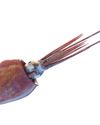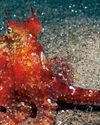Science

How It Works UK
Invisible 'flickering' on the Sun could predict dangerous solar flares
Shining loops of plasma on the surface of the Sun 'flicker' hours before they unleash potentially dangerous solar flares.
2 min |
Issue 200

How It Works UK
INCREDIBLE SOLAR SYSTEM CRATERS
Why these spectacular craters carved out by past impact events are among the most widespread and distinctive geological features in the Solar System
7 min |
Issue 198

How It Works UK
HOW NORTH AMERICA'S GREAT LAKES FORMED
The world's largest freshwater system comprises five immense interconnected lakes, carved into Earth by glaciers
5 min |
Issue 198

How It Works UK
BUILDING THE WORLD'S DEEPEST CAR PARK
Australia's most famous landmark is often marvelled at from ground level, but its innovative spiral substructure is a hidden gem
2 min |
Issue 198

How It Works UK
FINDING THE COLOSSAL SQUID
This elusive creature spawned a legend of a deep-sea monster that endured for centuries
2 min |
Issue 198

How It Works UK
Octopuses burn more calories changing colour than you do on a 23 minute run
For octopuses, changing colour burns about as many calories as a human on a 23-minute run. Octopuses are masters of disguise, changing colour at the drop of a hat to startle predators and hide from prey.
2 min |
Issue 198
How It Works UK
The world's first silicon-anode battery could revolutionise electronic vehicles
A ceramic battery manufacturer has unveiled a solid-state battery concept that can be charged from 5 to 60 per cent capacity in just five minutes, giving future electric vehicles (EVS) a 186-mile range in the time it takes to order a coffee.
1 min |
Issue 198

How It Works UK
New technology gives AI the power to feel surfaces
Scientists have given artificial intelligence (AI) the capacity to 'feel' surfaces for the first time, opening up a new dimension for deploying the technology in the real world.
1 min |
Issue 198

How It Works UK
Visit Plane Earth 2125
How might our world have transformed under the strain of climate change 100 years from now?
4 min |
Issue 198

How It Works UK
The world's largest organism may have been growing for 80,000 years
Pando, an enormous quaking aspen that spans more than 40 hectares in Utah, is not only one of the largest known organisms on Earth, it's also one of the oldest.
2 min |
Issue 198

How It Works UK
Scientists detect the most powerful cosmic rays ever
Scientists have detected the most energetic cosmic rays ever discovered, and they're being produced by mysterious sources relatively close to Earth.
2 min |
Issue 198

How It Works UK
Mountain lions in Los Angeles are becoming nocturnal
Mountain lions are prowling Greater Los Angeles at night to avoid humans exercising on their mountains.
2 min |
Issue 198

How It Works UK
THE POWER OF WATER
We're hooked on fossil fuels. But hydroelectric power is becoming an increasingly important replacement for coal and oil
4 min |
Issue 195

How It Works UK
EXPLORING THE MOON'S CAVES
Earth's rocky neighbour is home to a network of unexplored caves, and scientists are keen to take a peek inside
3 min |
Issue 195

How It Works UK
HOW TO ELECT THE PRESIDENT
The campaigns, votes and elections that put someone in America's most powerful office
3 min |
Issue 195

How It Works UK
WHAT IS MORNING SICKNESS?
Why some pregnancies can cause nausea and vomiting
2 min |
Issue 195

How It Works UK
20 WEIRDEST SCIENCE MYSTERIES
From dark matter to deep-sea crabs, science still can't fully explain these strange quirks of nature
10+ min |
Issue 195

How It Works UK
THE TRIANGULUM GALAXY SHINES IN A NEW HUBBLE IMAGE
A nearby galaxy is shining with star formation in a new image from the Hubble Space Telescope.
1 min |
Issue 195

How It Works UK
The world's fastest charger fully powers smartphones in five minutes
Scientists have revealed the fastest battery-charging technology in the world for smartphones, which can fully charge a smartphone in less than five minutes.
2 min |
Issue 195

How It Works UK
Real-time brain stimulation slashes Parkinson's symptoms by half in trials
Brain stimulation that rapidly adjusts in real-time can dramatically reduce Parkinson’s symptoms, an early trial suggests.
2 min |
Issue 195

How It Works UK
The hottest ocean temperature in 400 years threatens the Great Barrier Reef
The Great Barrier Reef is facing the hottest sea surface temperatures in four centuries.
2 min |
Issue 195

How It Works UK
Massive medieval coin hoard worth about 150 sheep' discovered
Archaeologists in Germany have unearthed over 1,500 medieval silver coins after a citizen noticed what looked like ‘small metal plates’ while digging during a construction project.
2 min |
Issue 195

How It Works UK
THE WORLD'S OLDEST PERSON DIES AGED 117 YEARS OLD
Maria Branyas Morera, the oldest person in the world, has died.
1 min |
Issue 195

How It Works UK
A new reactor could triple yields of a valuable chemical
A new reactor could turn wastewater into drinking water while also generating one of the world’s most sought-after chemicals.
2 min |
Issue 195

How It Works UK
NASA'S SOLAR SAIL SPREADS ITS WINGS IN SPACE
Over four months after launching to space, a solar-sailing spacecraft has spread its wings above our planet.
1 min |
Issue 195

How It Works UK
Albatross eating mice sentenced to death by 'bombing'
Invasive mice are eating albatrosses alive on a remote island in the Indian Ocean, so conservationists have come up with an explosive solution: ‘bombing’ the mice.
2 min |
Issue 195

How It Works UK
XB-1 PROTOTYPE ACES ITS SECOND TEST FLIGHT
Colorado-based company Boom Supersonic’s XB-1 supersonic demonstrator aircraft flew for the second time ever on 26 August 2024.
1 min |
Issue 195

How It Works UK
Deep-sea Arctic microbes may harbour next-generation antibiotics
The frigid waters of the Arctic may harbour the secret to a totally new type of antibiotic.
2 min |
Issue 195

How It Works UK
Physicists solve a nuclear fusion.mystery with mayonnaise
Nuclear fusion technology could get a breakthrough from an unexpected place: mayonnaise. In a new study, scientists plopped the creamy condiment into a churning machine and set it whirling to see what conditions made it flow.
2 min |
Issue 195

How It Works UK
RESCUE IN SPACE
Fortunately, space emergencies are a rare occurrence, but astronauts and space agencies need to be prepared for any eventuality that might arise
6 min |